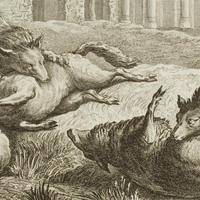Jagd auf Wölfe
hunting wolves
La caza del lobo
Caccia al lupo
Polowanie na wilki
Caça aos lobos
Охота на волков
Kurtları avlamak
Wölfe stehen unter Schutz.
Wolves are under protection.
Волки находятся под защитой.
狼受到保护。
Manchmal machen sie aber Probleme.
But sometimes they cause problems.
Mas, por vezes, causam problemas.
Но иногда они создают проблемы.
Niekedy však spôsobujú problémy.
但是有时它们会引起问题。
Deshalb gibt es Streit.
That's why there is a fight.
É por isso que existe um litígio.
Поэтому и возникает спор.
Preto vznikol spor.
这就是为什么存在争议的原因。
Es geht darum, wann sie abgeschossen werden dürfen.
It's about when they can be shot down.
Si tratta di quando è possibile abbatterli.
Trata-se de saber quando é que podem ser abatidos.
Речь идет о том, когда их можно сбить.
Ide o to, kedy ich možno zostreliť.
关于何时可以击落它们。
Die Bundesregierung hat jetzt dazu ein Gesetz gemacht.
The federal government has now made a law on this.
O governo federal adoptou agora uma lei sobre esta matéria.
Федеральное правительство приняло закон об этом.
联邦政府现在已经就此制定了法律。
In dem Gesetzentwurf von dem Umweltministerium gibt es neue Regeln für den Schutz von den Wölfen.
In the bill from the Ministry of Environment there are new rules for the protection of wolves.
O projeto de lei do Ministério do Ambiente prevê novas regras para a proteção dos lobos.
В законопроекте Министерства охраны окружающей среды содержатся новые правила по защите волков.
Die Regeln sind weniger streng.
The rules are less strict.
As regras são menos rigorosas.
Правила менее строгие.
Pravidlá sú menej prísne.
规则不太严格。
Das heißt: Jäger und Jägerinnen dürfen Wölfe erschießen, wenn diese zum Beispiel Schafe angreifen.
This means that hunters and hunters are allowed to shoot wolves if they attack sheep, for example.
Isto significa que os caçadores podem abater lobos se estes atacarem ovelhas, por exemplo.
Это означает, что охотникам разрешено стрелять в волков, если они, например, нападают на овец.
To znamená, že poľovníci môžu zastreliť vlka, ak napadne napríklad ovcu.
这意味着:例如,猎人攻击绵羊就可以射杀狼。
Dabei muss nicht feststehen, welcher Wolf aus dem Rudel das Schaf getötet hat.
It does not have to be clear which wolf from the pack has killed the sheep.
Non è necessario sapere quale lupo del branco ha ucciso la pecora.
Não é necessário saber qual o lobo da matilha que matou a ovelha.
Не обязательно должно быть ясно, какой волк из стаи убил овцу.
Nie je potrebné vedieť, ktorý vlk zo svorky zabil ovcu.
不必确定背包中的哪只狼杀死了绵羊。
Umweltschutz-Verbände sagen: Wir haben Angst, dass dann das gesamte Rudel abgeschossen wird.
Environmentalists say: We are afraid that then the entire pack will be shot down.
As associações de proteção do ambiente afirmam: "Receamos que todo o pacote seja abatido.
В ассоциациях по охране окружающей среды говорят: мы боимся, что всю свору потом перестреляют.
环保协会说:我们担心整个包装将被击落。
Schäferinnen und Schäfer sagen dagegen: Das ist ein gutes Gesetz zum Schutz unserer Tiere.
Shepherds, on the other hand, say that this is a good law to protect our animals.
Os pastores dizem que não: Esta é uma boa lei para proteger os nossos animais.
Пастухи говорят "нет": Это хороший закон, защищающий наших животных.
Pastieri hovoria proti: Je to dobrý zákon na ochranu našich zvierat.
另一方面,牧羊人说这是保护我们动物的好法律。
Die Landwirtschaftsministerin heißt Julia Klöckner.
The Agriculture Minister is Julia Klöckner.
Министр сельского хозяйства - Юлия Клёкнер.
农业部长是茱莉亚·克洛克纳(JuliaKlöckner)。
Sie meint: Es sollte auch erlaubt sein, einen Wolf zu erschießen, bevor er Probleme macht.
She says: It should also be allowed to shoot a wolf before it causes problems.
Она считает, что также следует разрешить стрелять в волка, прежде чем это вызовет проблемы.
Myslí si, že by malo byť povolené zastreliť vlka skôr, ako spôsobí problémy.
她说:还应该允许它在造成问题之前射杀狼。
In Deutschland gibt es erst seit ein paar Jahren wieder Wölfe.
In Germany there are wolves again only a few years ago.
In Germania, i lupi sono tornati in circolazione solo da pochi anni.
Волки вернулись в Германию всего несколько лет назад.
V Nemecku sa vlci opäť objavili len pred niekoľkými rokmi.
在德国,只有几年了。
Wolfsrudel leben etwa in den Bundesländern Brandenburg und Sachsen.
Wolf pack live approximately in the states of Brandenburg and Saxony.
I branchi di lupi vivono, ad esempio, negli Stati federali del Brandeburgo e della Sassonia.
Например, волчьи стаи живут в федеральных землях Бранденбург и Саксония.
狼群生活在勃兰登堡州和萨克森州。

